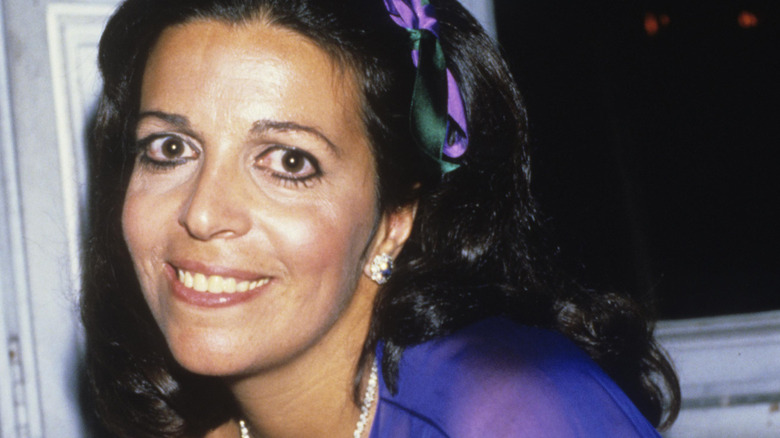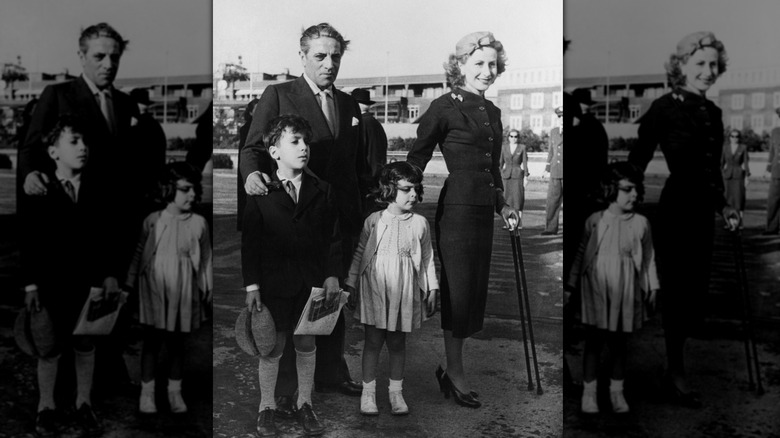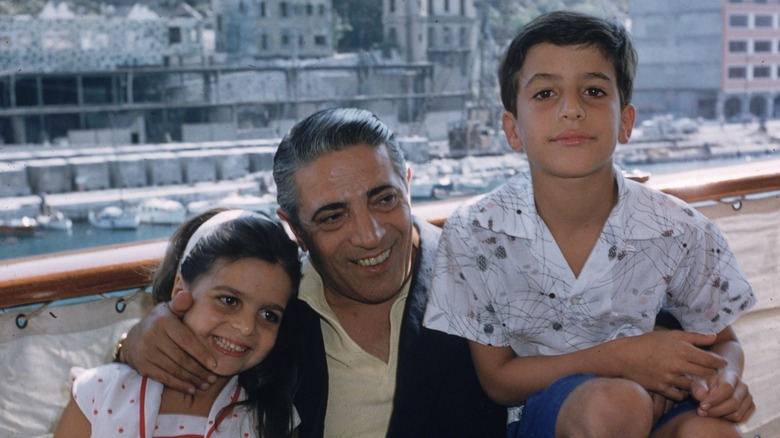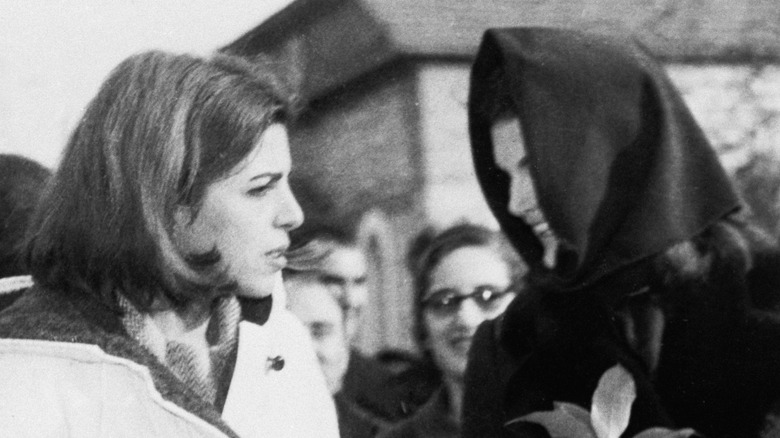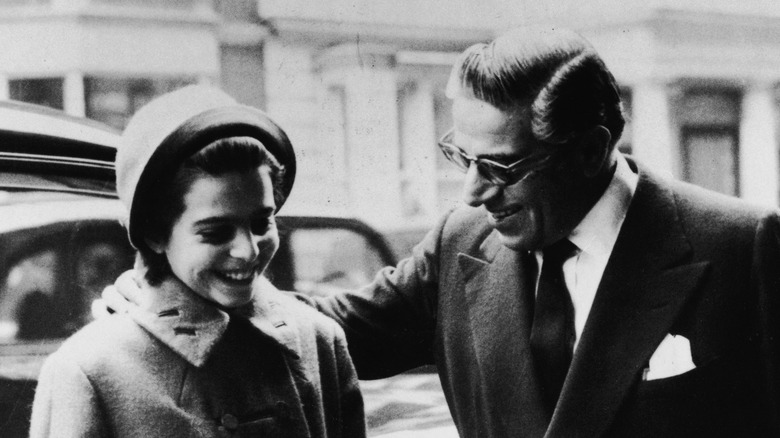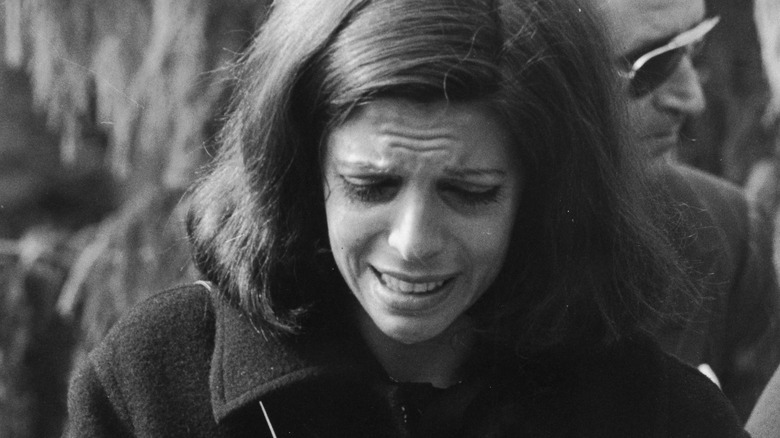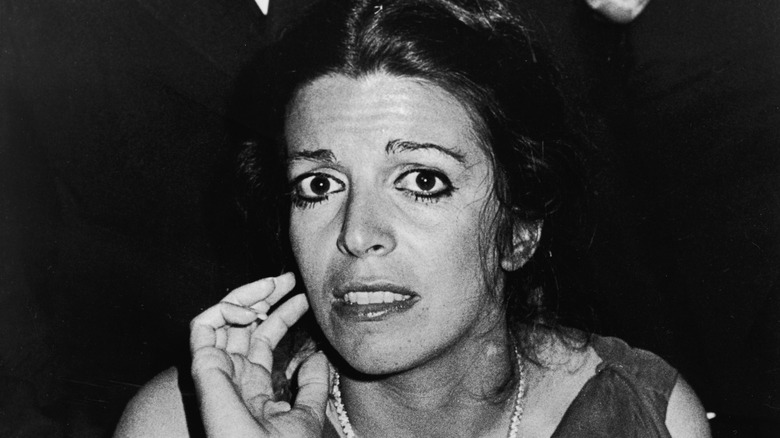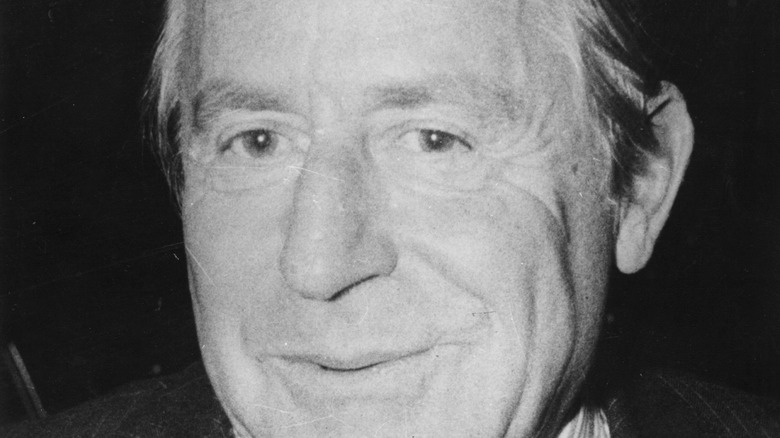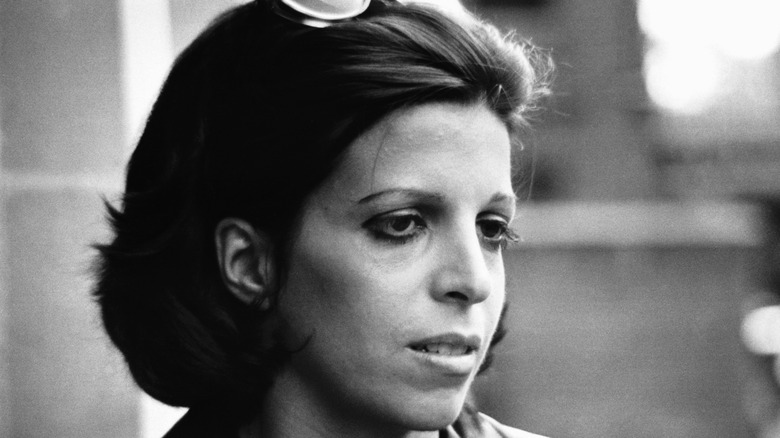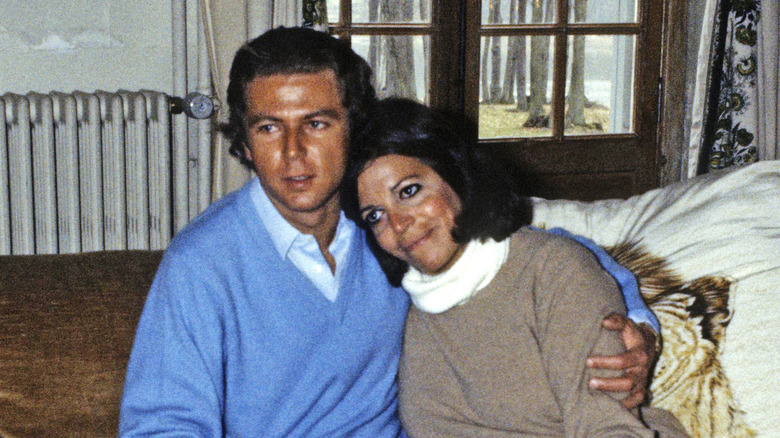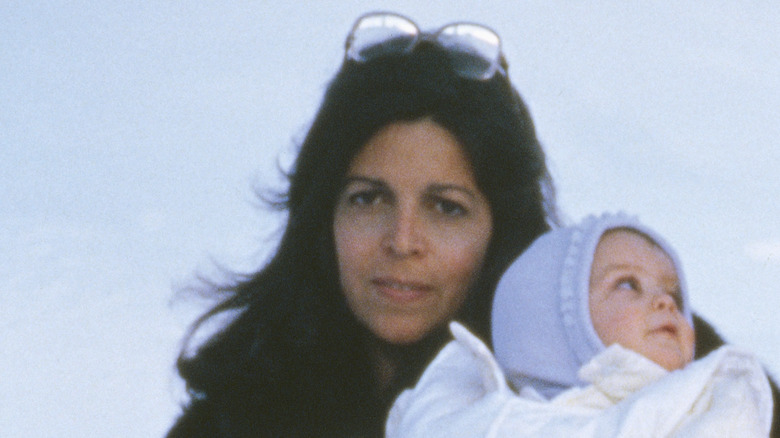Tragic Details About Christina Onassis
It's hard to imagine that Christina Onassis would have enjoyed being branded a "poor little rich girl" by the press (specifically the Argentine newspaper La Nación, per the Los Angeles Times). It's hardly a glowing summary of a lifetime. But by the time of her death in 1988, at just 37 years old, there was much about Onassis' life that smacked of tragedy.
She and her family had long been made sport of by cynical onlookers. Their fortune, once estimated to have crossed the $1 billion mark, had shrunk to $250 million just before Onassis' death. Even that amount of wealth was widely held to have dampened her love life. Her affairs, her weight, and her looks were mocked, and all remained insecurities for the woman herself, to be battled with junk food and diet pills. A peripheral character in the Kennedy legacy, she never took to her stepmother Jackie Kennedy. Her relationships seemed to come on a whim and fell apart just as quickly. And her family all seemed to meet with unhappy ends.
That Onassis was an effective steward of the family shipping business, or that she seemed to be getting a new lease on life before her death, tended to be overlooked. And her stepsister Henrietta Gelber told People that she doubted Onassis herself could ever have had a happy life. "What she was striving for," said Gelber, "was just to be a normal human being with normal family relationships, which was virtually impossible in her situation."
She was an unwanted child
Christina Onassis was born on December 11, 1950, in New York City. By that time, the family fortune had already been made, though it hadn't reached into the billions yet. Aristotle Onassis, her father, arrived in Argentina almost 30 years earlier as a poor Greek immigrant and transformed himself into an international tycoon through his shipping business. Expanding that business seemed to be a factor in Aristotle's choice of bride; he married Athina "Tina" Livanos, daughter to another Greek shipping magnate, in 1946.
Two years later, the photogenic couple had their first child, Alexander Onassis. One son and heir was all the children Aristotle wanted. According to William Wright's "All the Pain That Money Can Buy: The Life of Christina Onassis," Aristotle told many people, including his wife, that more children would dilute the value of his name and complicate the future of the business and fortune. Tina acquiesced by terminating two pregnancies, despite her increasingly strained marriage. But when she became pregnant in 1950, Tina — who privately expected to divorce and remarry — didn't want to risk her own health with another abortion, and not even a violent beating from Aristotle could change her mind.
When Christina was born, however, Tina was in some ways the more resentful parent. Though she loved her daughter, she was disturbed by Christina's close physical resemblance to Aristotle and doubted her own fitness to be a mother to either child.
She suffered from selective mutism as a child
Growing up, Christina Onassis rarely had her parents' full attention. Her mother Tina Onassis, despite loving her children, struggled to overcome her own mental health issues and a nagging doubt that she knew how to mother. Aristotle Onassis, who hadn't wanted any more children after his son Alexander Onassis, was affectionate enough with Christina to give her the nickname "Chryso mou" ("my golden one" in Greek, per the Chicago Tribune), but he was often away. Both had personal and professional concerns that did not include their children, who were primarily raised by servants.
Against this family backdrop, Christina suddenly stopped speaking at age 3. The regression brought her the undivided attention of her parents and household staff, albeit briefly. A psychological assessment in Zürich concluded that she had developed a form of selective mutism that was specifically named mercurial mutism and blamed on an overprotective home environment — not exactly a thorough accounting of Christina's upbringing. Author William Wright suggested in his biography of Christina Onassis that Christina just refused to talk to try and get noticed by parents who spent too little time with her, not too much.
If it was a deliberate act, however, it was one Christina claimed not to remember when she grew up. And her mutism would return, to some extent, when she learned of her parents' divorce.
She never recovered from her parents' divorce and distrusted Jackie Kennedy
Divorce is a difficult thing for children to comprehend and accept; for Christina Onassis, acceptance never came. Her parents separated in 1959, when she was 8 years old, and divorced the year after. While the marriage of Aristotle and Tina Onassis had long been unstable, his open affair with the opera singer Maria Callas proved the last straw. Aristotle had tolerated an affair of Tina's years earlier, but the ostentatious display he made of his dalliance infuriated his wife. She left with the children and arranged for as visible and scandalous a divorce announcement as she could.
Christina reacted to the divorce initially by regressing into mutism, then nursing a grudge against Callas. Well into adulthood, she regarded the divorce as an unwelcome intrusion into a happy home life that would one day be mended, despite the reality that her parents were often distant and neglectful to her even before separating. And when her father remarried, to Jackie Kennedy, Christina never came to like Kennedy. "My father's unfortunate obsession" is how she described her (per William Wright's "All the Pain That Money Can Buy"). Kennedy's personality and the vast age difference between her and Aristotle upset Christina, but it couldn't have helped that Aristotle pressured Christina to take after her stepmother.
Christina Onassis was manipulated into relationships by both parents
The major players of the Greek shipping business could take a dynastic attitude toward their work, and Christina Onassis found herself a pawn of both her parents' schemes for expansion and consolidation over the years. When she was 22, her mother Tina Onassis tried to arrange a marriage between Christina and Philippe Niarchos. Philippe was the son of Stavros Niarchos, Aristotle Onassis' great business rival, and Eugenie Livanos, Tina's sister, making Philippe Christina's first cousin. If that didn't make the proposed match gothic enough, Tina had married Stavros after her divorce and her sister's death.
According to William Wright's book, Christina was frank with her mother that she liked her cousin but did not love him. She and Philippe were willing to try a romance for the sake of family, but it wasn't happening. In that case, the cousins called things off after a fit of giggles. But Christina would not so easily escape her father's matchmaking efforts several years later. He wanted her to marry Peter Goulandris, another Greek shipping heir whose fortune could be brought into the Onassis orbit.
Tina approved of Goulandris and helped Aristotle to pressure their daughter. Christina rebelled by persisting with her own romance, with Danny Marentette, and dodging her father's calls. But Aristotle wouldn't take no for an answer. He extracted a deathbed promise from Christina to marry Goulandris; she didn't keep it.
She lost her father, mother, and brother within three years
Christina Onassis' upbringing was complicated and often unhappy, but she still loved her family. She would lose them all in less than three years. The first to go was her brother Alexander Onassis. After years maintaining a distant relationship, he and Christina reconnected as adults, in part out of mutual frustration with their father. As the firstborn, and a son, Alexander was in line to inherit the Onassis family business, and he and Aristotle Onassis often clashed. One of their fights was over Alexander's hobby of flying planes. Despite being a careful pilot, his head was crushed in a plane crash in Athens in 1972.
Alexander's death consumed his family. Aristotle, who began training Christina to run his shipping empire, never fully recovered from the loss. According to William Wright's "All the Pain That Money Can Buy," he fell into paranoid suspicions of murder, suspecting nearly everyone close to him except Christina of killing Alexander. His own health suffered from muscular deterioration. He died in 1975 after gallbladder surgery, with Christina by his bedside.
In between Alexander and Aristotle's deaths, Christina's mother Tina Onassis died. Her death was blamed on pulmonary edema after an overdose of pills. But Christina always suspected her mother's husband, Stavros Niarchos, of foul play. Niarchos' earlier wife Eugenie Niarchos, Tina's sister, had died under similar circumstances several years before.
She had a history of suicidal ideation
On top of the many unfortunate episodes of her life, Christina Onassis struggled with clinical depression. Several times over the years, this manifested as suicidal behavior. Her aunt Eugenie Livanos and her mother Tina Onassis were both believed to have died from an overdose of pills while married to Stavros Niarchos. Christina, who believed her uncle-stepfather to have murdered Eugenie, overdosed herself when she learned that her mother and Niarchos planned to marry.
She turned to pills again during a difficult period in her relationship with Peter Goulandris, who she remained with in part to please her ailing father. She was quickly taken to Middlesex Hospital in London, which saved her life. She relayed the incident herself to friend and writer Nicholas Papanicolaou with a rather flippant phone call, per William Wright's "All the Pain That Money Can Buy." Her mother came to her bedside to care for her, and she made a fairly quick recovery.
In 1975, after literally standing by her father's side in his final hours, Christina fell into another wave of depression. After her father's passing, she attempted suicide at the hospital with a stolen surgeon's tool. Staff prevented her from doing more than superficial damage to one wrist.
If you or someone you know is struggling or in crisis, help is available. Call or text 988 or chat 988lifeline.org
She suspected her uncle/stepfather of murder
Among the most complicated and harmful relationships in Christina Onassis' life was the one she had with Stavros Niarchos. For a time, he was Christina's uncle, having married her aunt Eugenie Livanos. Later, he became Christina's stepfather when he married her mother. And, at least in Christina's mind, he was the murderer of both women.
It wasn't only Christina who harbored suspicions about Niarchos. Her brother Alexander Onassis and her father Aristotle Onassis both felt the same. It was only the Livanos family, Christina's mother included, who thought that he didn't have something to do with Eugenie's death, despite the numerous injuries on her body. Tina Onassis was unmarked at the time of her death, but according to William Wright's book," Niarchos was confirmed to have been in the house when she died, only inflaming Christina's suspicions. Aristotle, fearful after his daughter's recent suicide attempt, tried to quell her suspicions despite sharing them.
Against her father's wishes, Christina sought an autopsy on her mother and fed her suspicions to the press. In retaliation, Niarchos leaked knowledge of one of Christina's suicide attempts and insinuated that the worry and stress it caused Tina contributed to her death.
She was obsessed with a man who didn't want her
A consistent theme across articles and biographies written on Christina Onassis is what a disaster her love life was. For whatever reason, all of her romantic relationships fell apart. In this, she was not unlike her father, though Onassis saw an important distinction. "My father was never happy in love, but he was always successful," she once said (via the Chicago Tribune). "With me, it is always the other way around."
But there was one romantic attachment of hers that was neither happy nor successful. In her youth, her eye was caught by Mick Flick, the heir to the Mercedes Benz fortune, and he remained a source of infatuation for her throughout the years, marriages, and divorces. Given Flick's vast wealth, Onassis' father wasn't against the thought of him as a son-in-law. But Flick consistently declined Onassis' affections.
She kept trying over the years. When she learned that Flick liked blondes, she dyed her naturally dark hair, but Flick was turned off instead of attracted. The two kept crossing paths, but never as lovers. Onassis was obsessed enough that, when she got wind of the women Flick did date, she would harass them on the phone for details.
Was Christina Onassis used by the KGB?
Christina Onassis married four times, all of them ending in divorce. The reasons varied, as did the impact on Onassis herself. But only one of her marriages became a subject of interest for intelligence agencies. That was her union with husband number three, Sergei Kauzov.
Like Onassis herself, Kauzov was in the shipping business, in his case with a base in his native Russia. But Kauzov's lifestyle seemed to some disproportionately lavish to his reported earnings. An unremarkable apartment in Moscow stood in stark contrast to the time he spent in a nomadic but luxurious lifestyle in France that he detailed in expatriate newspapers. A fear grew in some corners of the CIA that Kauzov was a KGB agent, and that his entire relationship with Onassis was a KGB plot. As head of a major Western shipping firm, Onassis would have valuable information about energy developments in the free world. Who better than a husband to pry such information out of her?
Onassis biographer Nigel Dempster rejected the theory (per the Chicago Tribune), as did experts on the KGB. Kauzov didn't fit the profile of a suave seducer, and too much else about his life and movements didn't add up. At most, the KGB might have seen some propaganda value in having Onassis marry into a notable Russian family. But she found life in Moscow dull, and by the time she and Kauzov tied the knot, the romance was gone from their relationship.
Her marriages were wrecked by family sabotage and business intrigues
The forces working against Christina Onassis' four marriages were many. In the case of her third marriage, to Russian shipping magnate Sergei Kauzov, her own boredom and lack of feeling for Kauzov ended things. But before and after that divorce, darker pressures affected her unions. Not least of these was the campaign her father waged against her first husband, Joseph Bolker. Twenty-seven years Christina's senior, Bolker was a sympathetic husband. But his age, his Jewish background, and the fact that he wasn't personally chosen or approved by Aristotle Onassis inspired a fierce campaign on his part to smear Bolker's name with his daughter, to some limited success (per William Wright's "All the Pain That Money Can Buy"). She and Bolker divorced after nine months.
Christina's father and family initially approved of her second husband, Alexander Andreadis. He was Greek like them, and he was a shipping magnate in his own right. But after they tied the knot, it emerged that the Andreadis fortune was in trouble. He wanted $20 million from his wife, who had just come into her inheritance from her father. Christina had hoped that Andreadis' background was a guarantee against his wanting her for her money; she was now convinced he was a gold-digger. They divorced after 14 months. Her final marriage, to Thierry Roussel, ended on a less dramatic but just as painful note for Christina; Roussel was having an affair.
She was turning her life around just before her death
Much about Christina Onassis' death in 1988 was grim. There was her age at the time, only 37 years old. There was the echo of her mother's death; both were ruled to have died from pulmonary edema. There were also whispers about the nature of her death. A judge had found cause to open an investigation into the circumstances, and there were rumors of murder, suicide, or a medication overdose. These were refuted by the autopsy, which found no grounds to suspect any such circumstances.
But perhaps the most tragic aspect of Onassis' death was that, when it came, her life was beginning to turn around. Though her fourth marriage had ended in divorce like the rest, she and ex-husband Thierry Roussel were still in each other's lives. They'd had a child together, Athina Roussel, and planned to have more through artificial insemination. Onassis was enjoying time in Argentina and had just bought a ranch near Buenos Aires to spend part of the year at.
She was also losing weight, which biographer Nigel Dempster suspected might have helped lead to her death (per the Chicago Tribune). A lifetime of cycling through compulsive eating and diet pills, he reasoned, weakened her body.
